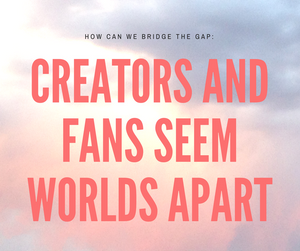Fan Fiction: What is it and Why Should You Care?
- moommbanks
- Mar 8, 2018
- 3 min read

One way that fans express their love of their chosen fandom is by creating content for other fans to read and enjoy. Much like fandom in general, fan fiction - defined as written works involving popular fictional characters and written by fans - has been a part of healthy societies for centuries. Classical works like Dante Alighieri's Inferno, or John Milton's Paradise Lost, for example, are fictional works written about popular characters from the Christian mythos such as Satan, Adam and Eve, and various archangels, as well as historical figures such as Virgil, whom Alighieri greatly admired. Sherlock Holmes' assorted stories were based on a man whom Sir Arthur Conan Doyle greatly admired - the stories have inspired and continue to inspire various iterations and tropes within different popular genres of storytelling.
In the early days of fan fiction which began to gain traction in the 1930s through the '60s, the written works of fans were often serialized in monthly or bimonthly magazines, or "fanzines," much in the same way that dime novels became popular in the mid- to late-nineteenth century. Fanzines were often distributed by mailing lists that were created by word of mouth - one fan telling his or her friends interested in the same subject about the magazine, and passing their information along to the creators who would adjust creation and distribution according to how many were on the mailing list. Creators often paid for the creation of fanzines out of their own pockets.
Often, the distribution of fanzines was small for a reason. There were several instances where popular artists received cease-and-desist letters from a creator, or creators were prosecuted for publishing things that violated "public decency laws" - that is, writing that contained explicit sexual content or hinted at homosexual relationships. It was this fear that kept fanfiction from reaching its true potential.
Then came the Internet.
Suddenly, with online access anonymity became an easy thing to possess. Not only that, but the creation of websites, online forums, and chatrooms helped to connect a vast network of people who were already involved in fandom and now wanted a way to speak to people they had once had no way of contacting. It was the Internet that created a strong sense of fan community. Without it, there may have been no fan vernacular or depositories through which we can study the popularity of different tropes, subjects, and creative works.
Shows like "Buffy the Vampire Slayer" and "The X-Files" are direct results of this sudden explosion of fan involvement. Joss Whedon, creator of "Buffy the Vampire Slayer," has talked openly about how he would visit fan forums to learn what people expected of coming episodes, and what they liked or disliked about the relationships between characters like Buffy and Faith.
Websites were created that were exclusively dedicated to allowing users to post fanfiction. In 2007, after then-popular site fanfiction.net introduced new rules which would censor a good portion of posted works, Archive of Our Own (AO3) was founded. The basis of AO3 is that it allows users to post fanfiction of any length, to create their own tags and categories for said work, and there are no limits to what can be posted on the site itself. While this policy does result in some truly unsavory writing, the idea behind it is that the community of fans must self-police itself and that way fans will not have to fear their work being censored in any way. AO3 is also a nonprofit organization - annual fundraisers are held on-site which gives fans the opportunity to support the website and in turn creates a symbiotic relationship between the administrators and users.










Comments